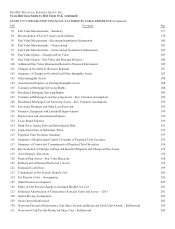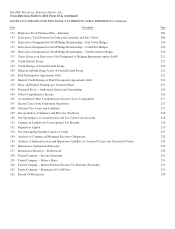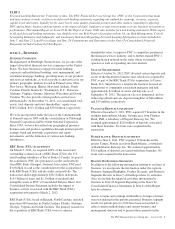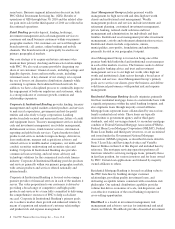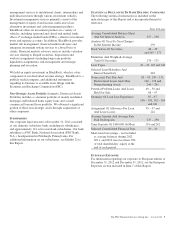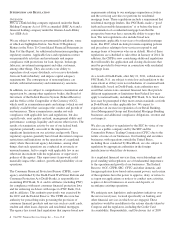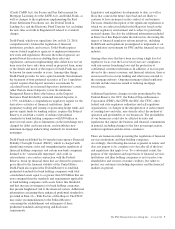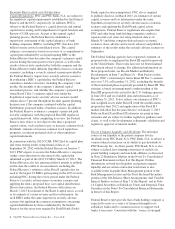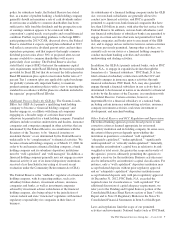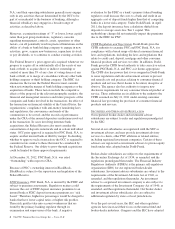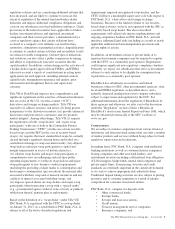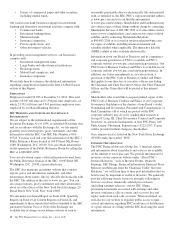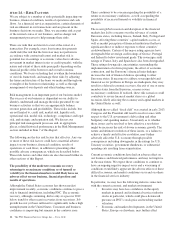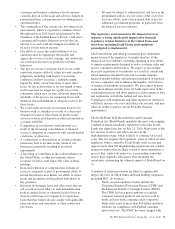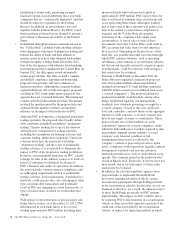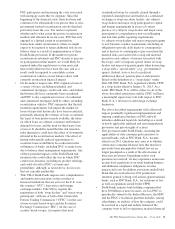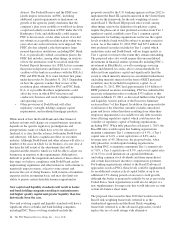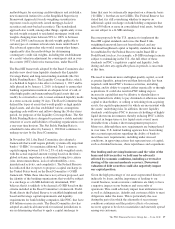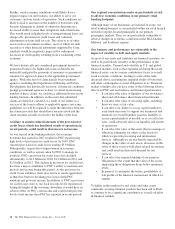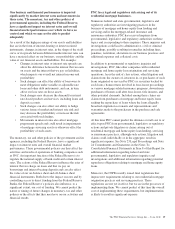PNC Bank 2012 Annual Report Download - page 28
Download and view the complete annual report
Please find page 28 of the 2012 PNC Bank annual report below. You can navigate through the pages in the report by either clicking on the pages listed below, or by using the keyword search tool below to find specific information within the annual report.regulatory reforms and are considering additional reforms that
have increased, and are likely to continue to increase, the
extent of regulation of the mutual fund and broker-dealer
industries and impose additional compliance obligations and
costs on our subsidiaries involved with those industries. Under
provisions of the federal securities laws applicable to broker-
dealers, investment advisers and registered investment
companies and their service providers, a determination by a
court or regulatory agency that certain violations have
occurred at a company or its affiliates can result in fines,
restitution, a limitation on permitted activities, disqualification
to continue to conduct certain activities and an inability to rely
on certain favorable exemptions. Certain types of infractions
and violations can also affect a public company in its timing
and ability to expeditiously issue new securities into the
capital markets. In addition, certain changes in the activities of
a broker-dealer require approval from FINRA, and FINRA
takes into account a variety of considerations in acting upon
applications for such approval, including internal controls,
capital levels, management experience and quality, prior
enforcement and disciplinary history and supervisory
concerns.
Title VII of Dodd-Frank imposes new comprehensive and
significant regulations on the activities of financial institutions
that are active in the U.S. over-the-counter (“OTC”)
derivatives and foreign exchange markets. Title VII was
enacted to (i) address systemic risk issues, (ii) bring greater
transparency to the derivatives markets, (iii) provide enhanced
disclosures and protection to customers, and (iv) promote
market integrity. Among other things, Title VII: (i) requires
the registration of both “swap dealers” and “major swap
participants” with one or both of the Commodity Futures
Trading Commission (“CFTC”) (in the case of non security-
based swaps) and the SEC (in the case of security-based
swaps); (ii) requires that most standardized swaps be centrally
cleared through a regulated clearing house and traded on a
centralized exchange or swap execution facility; (iii) subjects
swap dealers and major swap participants to capital and
margin requirements in excess of historical practice;
(iv) subjects swap dealers and major swap participants to
comprehensive new recordkeeping and real-time public
reporting requirements; (v) subjects swap dealers and major
swap participants to new business conduct requirements
(including the providing of daily marks to counterparties and
disclosing to counterparties (pre-execution) the material risks
associated with their swap and of material incentives and any
conflicts of interest associated with their swap); and
(vi) imposes special duties on swap dealers and major swap
participants when transacting a swap with a “special entity”
(e.g., governmental agency (federal, state or local) or political
subdivision thereof, pension plan or endowment).
Based on the definition of a “swap dealer” under Title VII,
PNC Bank, N.A. registered with the CFTC as a swap dealer
on January 31, 2013. As a result thereof, PNC Bank, N.A. is
subject to all of the above-described regulations and
requirements imposed on registered swap dealers, and the
CFTC will have a meaningful supervisory role with respect to
PNC Bank, N.A.’s derivatives and foreign exchange
businesses. Because of the limited volume of our security-
based swap activities, we have not registered with the SEC as
a security-based swap dealer. The above described
requirements will collectively impose implementation and
ongoing compliance burdens on PNC Bank, N.A. and will
introduce additional legal risks (including as a result of newly
applicable antifraud and anti-manipulation provisions and
private rights of action).
In addition, an investment adviser to private funds or to
registered investment companies may be required to register
with the CFTC as a commodity pool operator. Registration
could impose significant new regulatory compliance burdens.
Presently, we expect our subsidiaries that serve as investment
advisers to such entities to be eligible for exemptions from
registration as a commodity pool operator.
BlackRock has subsidiaries in securities and related
businesses subject to SEC, other governmental agencies, state,
local and FINRA regulation, as described above, and a
federally chartered nondepository trust company subsidiary
subject to supervision and regulation by the OCC. For
additional information about the regulation of BlackRock by
these agencies and otherwise, we refer you to the discussion
under the “Regulation” section of Item 1 Business in
BlackRock’s most recent Annual Report on Form 10-K, which
may be obtained electronically at the SEC’s website at
www.sec.gov.
C
OMPETITION
We are subject to intense competition from various financial
institutions and from non-bank entities that can offer a number
of similar products and services without being subject to bank
regulatory supervision and restrictions.
In making loans, PNC Bank, N.A. competes with traditional
banking institutions as well as consumer finance companies,
leasing companies and other non-bank lenders, and
institutional investors including collateralized loan obligation
(CLO) managers, hedge funds, mutual fund complexes and
private equity firms. Loan pricing, structure and credit
standards are extremely important in the current environment
as we seek to achieve appropriate risk-adjusted returns.
Traditional deposit-taking activities are also subject to pricing
pressures and to customer migration as a result of intense
competition for consumer investment dollars.
PNC Bank, N.A. competes for deposits with:
• Other commercial banks,
• Savings banks,
• Savings and loan associations,
• Credit unions,
• Treasury management service companies,
• Insurance companies, and
The PNC Financial Services Group, Inc. – Form 10-K 9


